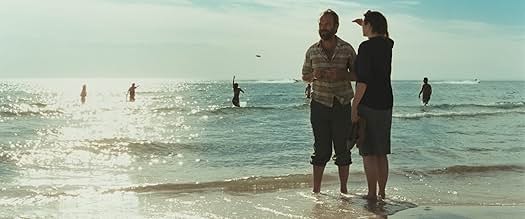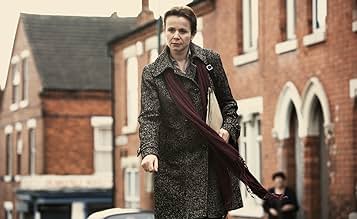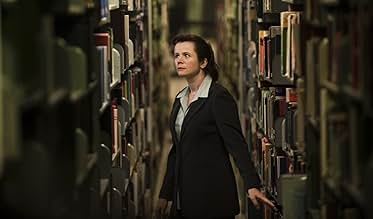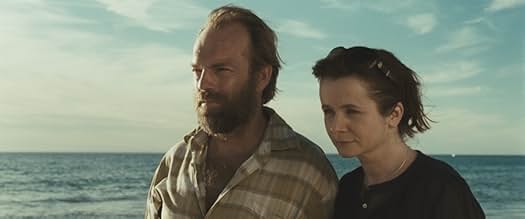AVALIAÇÃO DA IMDb
7,1/10
6,1 mil
SUA AVALIAÇÃO
Adicionar um enredo no seu idiomaSet in 1980s Nottingham, social worker Margaret Humphreys holds the British government accountable for child migration schemes and reunites the children involved -- now adults living mostly ... Ler tudoSet in 1980s Nottingham, social worker Margaret Humphreys holds the British government accountable for child migration schemes and reunites the children involved -- now adults living mostly in Australia -- with their parents in Britain.Set in 1980s Nottingham, social worker Margaret Humphreys holds the British government accountable for child migration schemes and reunites the children involved -- now adults living mostly in Australia -- with their parents in Britain.
- Direção
- Roteiristas
- Artistas
- Prêmios
- 10 vitórias e 21 indicações no total
Heath Tammy
- Susan
- (as Tammy Wakefield)
Alastair G. Cumming
- Australia House Official
- (as Alistair Cummings)
- Direção
- Roteiristas
- Elenco e equipe completos
- Produção, bilheteria e muito mais no IMDbPro
Avaliações em destaque
I caught this film as part of the Glasgow Film Festival and I'm glad that I did. Knowing very little of the story about the the organised deportation of children in care from the United Kingdom to Australia, I found much of this film was shocking and upsetting. This film concentrates on Margaret Humphrys, the social worker who uncovers this scandal. Under her own steam and then with the support of her employer, Margaret discovers that more than just a few children were deported. She makes it her mission to help those deportees who wish to find out about the families they were forced to leave behind. This proves to be no easy task as the British government stonewall her and provide no help with the details of the deportees or their families. No deliberate attempt is made to overplay the injustice or high emotions running through the story; it is told in a simple, straightforward and affecting manner and it is all the more powerful for that. Take some time out and go and see this film as it's one that deserves a wide audience and stay to the end as that's when the viewer finds out when an apology for this very sad situation was given.
Carronas' review could not be more wrong! She could not even get the directors name right. It's JIM not LEN Loach, and the rest of the review is just as inaccurate. I had no trouble following the story line even without any prior knowledge of the events. I had no trouble understanding where each scene was set, be it UK or Oz, it was perfectly clear which was which. The film stock helped to give that dated feel of the 1980's and this was further enhanced by the vehicles, furniture and fashions. The lack of dialogue in certain scenes (meeting the Brothers) added tension where words would have added nothing. This was an excellent film, well filmed and well acted. See it and enjoy.
I saw this truly extraordinary film last night ... and know now that it will be with me for a long time to come. The story is totally compelling and the acting is superb! Emily Watson is always a wonder to watch and she does some of her finest work here -- perhaps her best performance ever. The supporting players are, without exception, highly gifted and each finds his or her character to the point where you feel, at times, that you are watching a documentary, so fine are their portrayals. Based on the true experiences of social worker Margaret Humphreys (that will leave you with your mouth agape often)and with a beautifully written script that moves briskly ... and, at many turns, into frightening territory, with terrific direction, this is a must-see! Put it on your list! If there is any justice, this one will figure when the awards are handed out!
I can only give this a 10/10 due to the fact that i grew up with many of the fairbrigians and the Bindoon and Clontarf boys. I am a 62 year old and still socialise with some of these people. Fairbridge in Western Australia is situated just south of Perth and very close to Pinjarra. Every year they hold a Fairbridge festival that lasts for a whole weekend and hosts lots of activities including top groups and singers. I myself was once committed to a boys institution and met many of these kids that had ran away from Bindoon and other institutions that were abusive to them. Kingsley Fairbridge was not the abusive type and most Fairbrigians do not tell the same story as the Christian brothers torture. This movie portrays the story of Margaret Humphrey and her quest to find these -(now grown ups) to find their real parents. Only a very small portion found relatives. The goof here says that Margaret couldn't have moved to a stone house in Perth. Fremantle was the first landing and the first settlers along with convicts dug out a huge section of one of the hills which was limestone. Limestone was used for the building of almost -ALL the first buildings including the Fremantle prison. Many more houses and buildings in both Fremantle and Perth still stand today. I loved the movie and i believe it is very much close to the truth. A must to see.
Sarah's Key was critically lauded for its reliable method of evoking raw anguish in its audience by depicting the trauma of a savage injustice from a child's perspective. In the same year, Jim Loach's feature drama handles the similar material of an scandal that's just about on par with the Vel d'Hiv roundup, but the film's subjects are all well into adulthood by the time we are meeting them. The fact that the victims are always shown as adults (in physical form at least) has given the achievement of pulling off this excellent film a higher degree of difficulty, seeing as the actors and screenplay writers are required to work extra hard to win the audience's sympathy, rather than having the simple forgivable innocence of an actual child on screen doing the job. However, this is not to say that Sarah's Key was mere emotional pornography: it found excellent ways of challenging itself in other aspects which gave it a greater level of sophistication, but in terms of expressing the heartbreak, the feat of Oranges and Sunshine is much more remarkable.
Among the topics being explored here is the very complicated issue of adoption. The burdensome puzzle of how a child in an unstable family situation or an unhealthy state of living should receive professional help – whether such interference is truly protecting their best interests or inflicting deep psychological harm by depriving them of family – has long been troubling child protection authorities. In mid- twentieth-century England, the popular solution settled on was the organised deportation of these children to Australia. Told that they were orphans, with no living relatives to care for them, they would be sent over in large numbers and, once there, sold into slavery for a respected church organisation commonly refferrred to as "The Brothers".
Several decades later, a determined social worker from Nottingham has begun to single-handedly reunite the victims of the outrage with their family back in England. As they relate to her their heartwrenching stories, each with their own despicable atrocities on top of what has already been mentioned, the irreparable damage of being raised without a proper family becomes apparent, and they are reduced to miserable, vulnerable, homesick little children. Its frequent mentioning of mothers, its claim that the wound of lost parents will never truly heal, and the fact that most of the victims shown are boys creates very distinct allusions to Peter Pan, even before that similarity is actually mentioned by one of the people. An additional noticeable parallel between this film and another classic story is the idea of a child suffering lonesomely at the hands of a cruel organisation under the sneaky pretense that they are an orphan, which is reminiscent of Oliver Twist.
However, it would be grossly unfair to just cynically dissect this film using only comparisons: it displays a very impressive divergence from the typical conspiracy drama. Its most prominent asset is the fully- fledged characterisation of its activist hero and the equal attention spent on showing her suffering as well that of her clients. The delightful Emily Watson obviously does a great deal to bring her to life, playing her so brilliantly that she comes across as both perfectly likable and humanly multi-faceted. Hearing such painful stories is incredibly taxing, and the growing unpopularity she is gaining as she stirs the government and the press results in some truly terrifying personal attacks while she is staying in Australia, but as the authorities are refusing to assist her, she knows that she must not allows herself to withdraw from her mission as no one else will be willing to pick it up. She does, of course, also become estranged from her family as the task begins to consume her, but thankfully not instantly, allowing the satisfying realism to remain intact.
Also a relief is that a handful of the people she is helping are actually showing genuine gratitude and returning the favour by giving her personal assistance. The friendships she forms with these people are truly touching, and effectively lighten the situation for both the hero (Margaret) and the audience.
With a very capable supporting cast, featuring David Wenham, Hugo Weaving and Tara Morice (Strictly Ballroom), in the roles of the victims and Margaret's family, this is a highly commendable and worthwhile piece of filmmaking, let down only by the rather repetitive nature of the script, if anything.
Among the topics being explored here is the very complicated issue of adoption. The burdensome puzzle of how a child in an unstable family situation or an unhealthy state of living should receive professional help – whether such interference is truly protecting their best interests or inflicting deep psychological harm by depriving them of family – has long been troubling child protection authorities. In mid- twentieth-century England, the popular solution settled on was the organised deportation of these children to Australia. Told that they were orphans, with no living relatives to care for them, they would be sent over in large numbers and, once there, sold into slavery for a respected church organisation commonly refferrred to as "The Brothers".
Several decades later, a determined social worker from Nottingham has begun to single-handedly reunite the victims of the outrage with their family back in England. As they relate to her their heartwrenching stories, each with their own despicable atrocities on top of what has already been mentioned, the irreparable damage of being raised without a proper family becomes apparent, and they are reduced to miserable, vulnerable, homesick little children. Its frequent mentioning of mothers, its claim that the wound of lost parents will never truly heal, and the fact that most of the victims shown are boys creates very distinct allusions to Peter Pan, even before that similarity is actually mentioned by one of the people. An additional noticeable parallel between this film and another classic story is the idea of a child suffering lonesomely at the hands of a cruel organisation under the sneaky pretense that they are an orphan, which is reminiscent of Oliver Twist.
However, it would be grossly unfair to just cynically dissect this film using only comparisons: it displays a very impressive divergence from the typical conspiracy drama. Its most prominent asset is the fully- fledged characterisation of its activist hero and the equal attention spent on showing her suffering as well that of her clients. The delightful Emily Watson obviously does a great deal to bring her to life, playing her so brilliantly that she comes across as both perfectly likable and humanly multi-faceted. Hearing such painful stories is incredibly taxing, and the growing unpopularity she is gaining as she stirs the government and the press results in some truly terrifying personal attacks while she is staying in Australia, but as the authorities are refusing to assist her, she knows that she must not allows herself to withdraw from her mission as no one else will be willing to pick it up. She does, of course, also become estranged from her family as the task begins to consume her, but thankfully not instantly, allowing the satisfying realism to remain intact.
Also a relief is that a handful of the people she is helping are actually showing genuine gratitude and returning the favour by giving her personal assistance. The friendships she forms with these people are truly touching, and effectively lighten the situation for both the hero (Margaret) and the audience.
With a very capable supporting cast, featuring David Wenham, Hugo Weaving and Tara Morice (Strictly Ballroom), in the roles of the victims and Margaret's family, this is a highly commendable and worthwhile piece of filmmaking, let down only by the rather repetitive nature of the script, if anything.
Você sabia?
- CuriosidadesBased on true events, Margaret Humphreys was awarded the Medal of the Order of Australia in 1993, and awarded Commander of the British Empire in 2011 for her work.
- Erros de gravaçãoWhen Margaret is searching through the Public Records of Births and Marriages each entry gives full details, is handwritten, and sorted by town and presented in chronological order. In reality, to protect data they are single-line typed entries giving basics and references for obtaining full details, for anywhere in the country, and sorted alphabetically by surname for each quarter of the year.
- ConexõesFeatured in Breakfast: Episode dated 23 March 2011 (2011)
- Trilhas sonorasWild World
Written and performed by Cat Stevens
Courtesy of Universal-Island Records Ltd
Courtesy of Universal Music Operations Ltd
Published by EMI Music Publishing Ltd
Principais escolhas
Faça login para avaliar e ver a lista de recomendações personalizadas
- How long is Oranges and Sunshine?Fornecido pela Alexa
Detalhes
- Data de lançamento
- Países de origem
- Centrais de atendimento oficiais
- Idioma
- Também conhecido como
- Oranges and Sunshine
- Locações de filme
- Adelaide, Austrália do Sul, Austrália(location)
- Empresas de produção
- Consulte mais créditos da empresa na IMDbPro
Bilheteria
- Orçamento
- US$ 4.500.000 (estimativa)
- Faturamento bruto nos EUA e Canadá
- US$ 143.480
- Fim de semana de estreia nos EUA e Canadá
- US$ 18.600
- 23 de out. de 2011
- Faturamento bruto mundial
- US$ 5.017.653
- Tempo de duração1 hora 45 minutos
- Cor
- Mixagem de som
- Proporção
- 2.35 : 1
Contribua para esta página
Sugerir uma alteração ou adicionar conteúdo ausente

Principal brecha
By what name was Laranjas e Sol (2010) officially released in India in English?
Responda



































